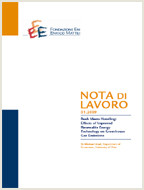Can Hypothetical Time Discounting Rates Predict Actual Behaviour: Evidence from a Randomized Experiment

23.11.2016
D01, D91, C93, O1
Time Preferences, Randomized Experiment, Senegal
Mitigation, Innovation and Transformation Pathways
Massimo Tavoni
This paper estimates time preference parameters using commonly-applied methodologies, with the aim of investigating the link between these measures and actual economic behaviour. An experiment was conducted in the city of Thies, in Senegal, using the unique reference numbers of banknotes as a means of determining an individual’s willingness to save money. The findings of this experiment provide an innovative comparison between real choices, and choices made in the presence of hypothetical rewards. Our research indicates that individuals display a far greater degree of patience, when the possibility of genuine financial gain is made available to them. Our results show that hypothetical time preferences parameters are poor predictors of actual behaviour, prompting questions over the validity of commonly used measurements.
***
Suggested citation: Bonan, J., P. LeMay-Boucher, D. Scott, (2016), ‘Can Hypothetical Time Discounting Rates Predict Actual Behaviour: Evidence from a Randomized Experiment’, Nota di Lavoro 74.2016, Milan, Italy: Fondazione Eni Enrico Mattei
